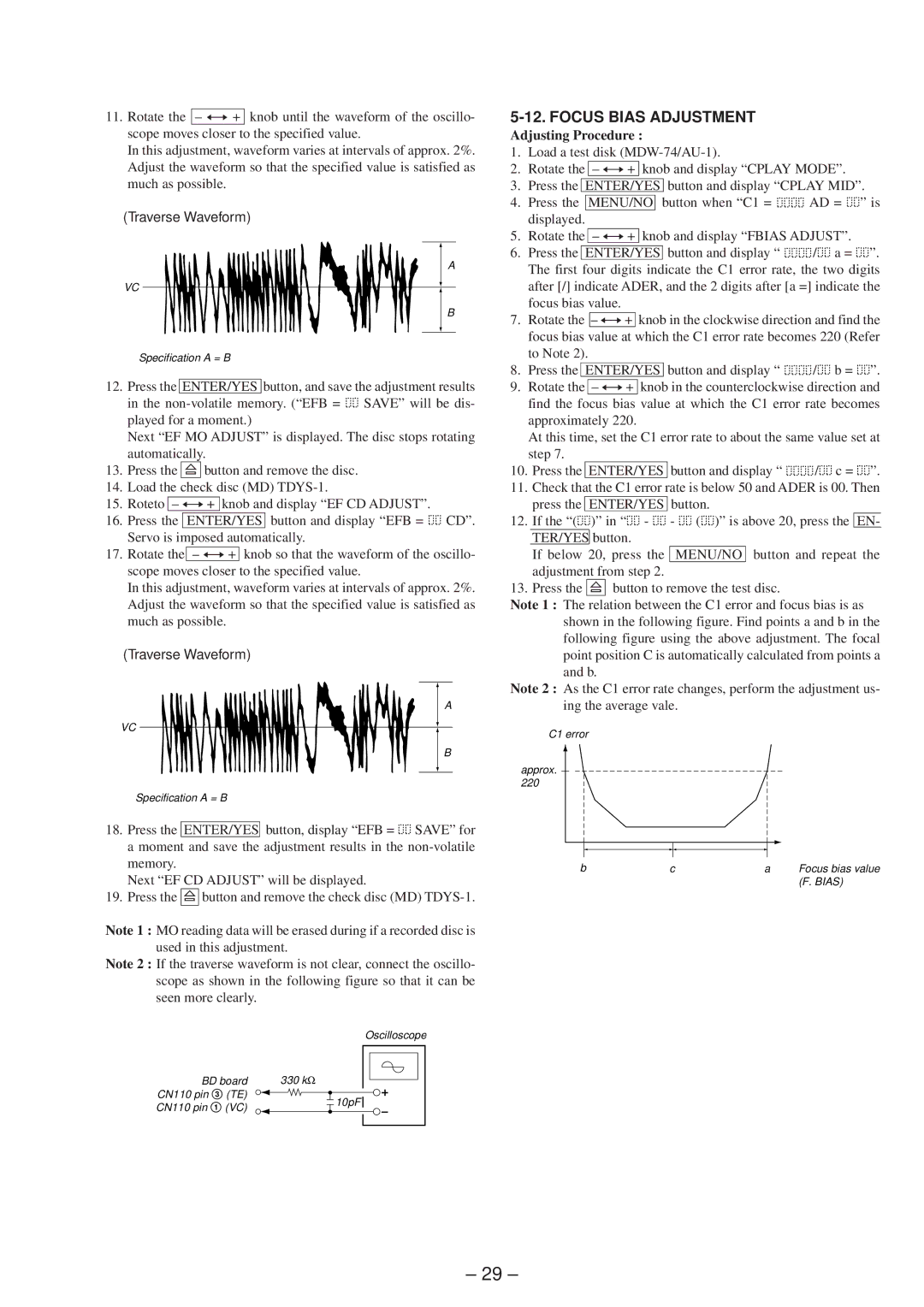
11.Rotate the
In this adjustment, waveform varies at intervals of approx. 2%. Adjust the waveform so that the specified value is satisfied as much as possible.
(Traverse Waveform)
A
VC
B
Specification A = B
12.Press the ENTER/YES button, and save the adjustment results
in the ![]()
![]() SAVE” will be dis- played for a moment.)
SAVE” will be dis- played for a moment.)
Next “EF MO ADJUST” is displayed. The disc stops rotating automatically.
13.Press the § button and remove the disc.
14.Load the check disc (MD)
15.Roteto
16.Press the ENTER/YES button and display “EFB = ![]()
![]() CD”. Servo is imposed automatically.
CD”. Servo is imposed automatically.
17.Rotate the
In this adjustment, waveform varies at intervals of approx. 2%. Adjust the waveform so that the specified value is satisfied as much as possible.
(Traverse Waveform)
A
VC
B
Specification A = B
18.Press the ENTER/YES button, display “EFB = ![]()
![]() SAVE” for a moment and save the adjustment results in the
SAVE” for a moment and save the adjustment results in the
Next “EF CD ADJUST” will be displayed.
19.Press the § button and remove the check disc (MD)
Note 1 : MO reading data will be erased during if a recorded disc is used in this adjustment.
Note 2 : If the traverse waveform is not clear, connect the oscillo- scope as shown in the following figure so that it can be seen more clearly.
Oscilloscope
BD board | 330 kΩ |
CN110 pin 3 (TE) | 10pF | ||
CN110 pin 1 | (VC) | ||
| |||
5-12. FOCUS BIAS ADJUSTMENT
Adjusting Procedure :
1.Load a test disk
2.Rotate the
3.Press the ENTER/YES button and display “CPLAY MID”.
4. Press the | MENU/NO | button when “C1 = | AD = ” is |
displayed. |
| ||
5.Rotate the
6.Press the ENTER/YES button and display “ ![]()
![]()
![]()
![]() /
/![]()
![]() a =
a = ![]()
![]()
![]()
![]() ”. The first four digits indicate the C1 error rate, the two digits after [/] indicate ADER, and the 2 digits after [a =] indicate the focus bias value.
”. The first four digits indicate the C1 error rate, the two digits after [/] indicate ADER, and the 2 digits after [a =] indicate the focus bias value.
7.Rotate the
8.Press the ENTER/YES button and display “ ![]()
![]()
![]()
![]()
![]()
![]()
![]()
![]() /
/![]()
![]()
![]()
![]() b =
b = ![]()
![]()
![]()
![]() ”.
”.
9.Rotate the
At this time, set the C1 error rate to about the same value set at step 7.
10.Press the ENTER/YES button and display “ ![]()
![]()
![]()
![]()
![]()
![]()
![]()
![]() /
/![]()
![]()
![]()
![]() c =
c = ![]()
![]()
![]()
![]() ”.
”.
11.Check that the C1 error rate is below 50 and ADER is 00. Then press the ENTER/YES button.
12. | If the “( | )” in “ - | - ( )” is above 20, press the | EN- | |
|
|
|
|
|
|
| TER/YES | button. |
|
|
|
| If below 20, press the |
| button and repeat the | ||
| MENU/NO | ||||
| adjustment from step 2. |
|
|
| |
13. | Press the | § button to remove the test disc. | |||
Note 1 : The relation between the C1 error and focus bias is as shown in the following figure. Find points a and b in the following figure using the above adjustment. The focal point position C is automatically calculated from points a and b.
Note 2 : As the C1 error rate changes, perform the adjustment us- ing the average vale.
C1 error
approx.
220
b | c | a | Focus bias value |
|
|
| (F. BIAS) |
– 29 –
